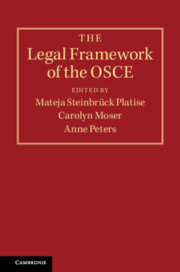Book contents
- The Legal Framework of the OSCE
- The Legal Framework of the OSCE
- Copyright page
- Contents
- Contributors
- Preface
- Abbreviations
- Part I Introduction
- Part II The Quest for International Legal Personality
- 2 Political Dynamics and Institutional Reforms in the OSCE
- 3 The Role of the Organisation in Asserting Legal Personality: the Position of the OSCE Secretariat on the OSCE’s Legal Status
- 4 The Role of the Participating States in Reforming the Legal Framework of the OSCE: Past Developments, Status Quo and Future Ambitions
- 5 ‘It’s Politics, Stupid’: an International Relations Perspective on Strengthening the Legal Framework of the OSCE
- 6 Domestic Implications of the OSCE’s Legal Personality under Russian Constitutional Law
- Part III Manifestations of the Legal Position under International Law
- Part IV The Legal and Institutional Framework as a Governance Issue
- Part V Conclusions
- Index
- References
5 - ‘It’s Politics, Stupid’: an International Relations Perspective on Strengthening the Legal Framework of the OSCE
from Part II - The Quest for International Legal Personality
Published online by Cambridge University Press: 15 August 2019
- The Legal Framework of the OSCE
- The Legal Framework of the OSCE
- Copyright page
- Contents
- Contributors
- Preface
- Abbreviations
- Part I Introduction
- Part II The Quest for International Legal Personality
- 2 Political Dynamics and Institutional Reforms in the OSCE
- 3 The Role of the Organisation in Asserting Legal Personality: the Position of the OSCE Secretariat on the OSCE’s Legal Status
- 4 The Role of the Participating States in Reforming the Legal Framework of the OSCE: Past Developments, Status Quo and Future Ambitions
- 5 ‘It’s Politics, Stupid’: an International Relations Perspective on Strengthening the Legal Framework of the OSCE
- 6 Domestic Implications of the OSCE’s Legal Personality under Russian Constitutional Law
- Part III Manifestations of the Legal Position under International Law
- Part IV The Legal and Institutional Framework as a Governance Issue
- Part V Conclusions
- Index
- References
- Type
- Chapter
- Information
- The Legal Framework of the OSCE , pp. 95 - 118Publisher: Cambridge University PressPrint publication year: 2019
References
- 2
- Cited by



